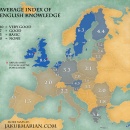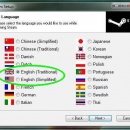 |
Out of the blue – meaning and origin of the English idiom
Out of the blue is an English idiom meaning “suddenly and unexpectedly”. You can use it when you are surprised by something that was not (...)
November 17, 2015 – Jakub Marian – English
|
 |
‘Content’ vs. ‘contents’ in English
The distinction between content and contents is a bit tricky. First of all, “content” can be a noun (pronounced /ˈkɒntɛnt/ in British (...)
November 15, 2015 – Jakub Marian – English
|
 |
Index of knowledge of English in Europe by country
Participants of the Eurobarometer 386 survey (organized by the European Commission) answered various questions about their knowledge of (...)
|
 |
Is American English ‘simplified’ and British English ‘traditional’?
I saw a funny picture today (see below) of an installation process that asked the user whether they would like to continue in “Traditional (...)
October 22, 2015 – Jakub Marian – English
|
 |
‘In comparison to’ vs. ‘in comparison with’ in English
Although “compare something to something” and “compare something with something” do not mean the same (you can read more about the (...)
October 19, 2015 – Jakub Marian – English
|
By the way, have you already seen my brand new web app for non-native speakers of English? It's based on reading texts and learning by having all meanings, pronunciations, grammar forms etc. easily accessible. It looks like this:
 |
‘Be late for’ vs. ‘be late to’ in English
When you want to take part in some activity and you are late, you can say either that you are “late for the activity” or that you are (...)
October 6, 2015 – Jakub Marian – English
|
 |
Is ‘that’ always restrictive and ‘which’ non-restrictive?
There are two basic types of subordinate (dependent) clauses in English. A clause is called non-restrictive if it adds only parenthetical (...)
September 20, 2015 – Jakub Marian – English
|
 |
Difference between ‘electronic’, ‘electric’, and ‘electrical’
The meanings of “electric”, “electrical”, and “electronic” often overlap, but the three adjectives are not completely interchangeable. The (...)
September 6, 2015 – Jakub Marian – English
|
 |
Comma before ‘because’ in English
“Because” introduces a dependent clause that almost always contains essential information (the whole sentence would sound incomplete (...)
August 31, 2015 – Jakub Marian – English
|
 |
Comma before ‘and’, ‘but’, ‘so’, etc., between independent clauses
Most languages don’t require a comma before “and” when it joins two independent clauses, but writing a comma before “but”, (...)
August 24, 2015 – Jakub Marian – English
|

